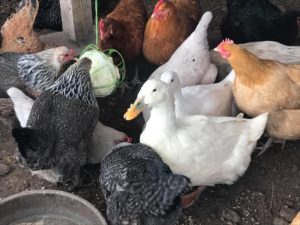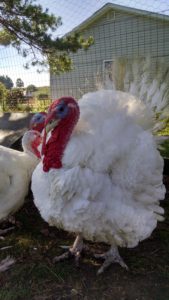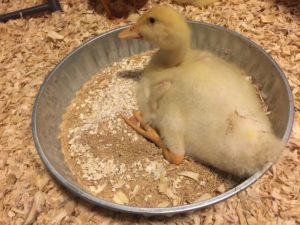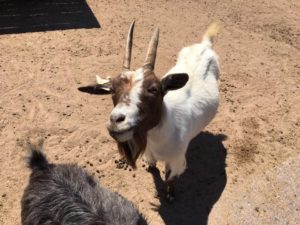Mixing it up, birds of different feathers CAN flock together.
Keeping a mixed flock is a thought bound to cross your mind when those spring chicks start arriving at the feed store. Maybe you have chickens and think you might like to add some ducks. Maybe you have ducks and want to expand into more waterfowl with geese. Or maybe you’re thinking about a big, juicy turkey at Thanksgiving and figure it can’t be that hard to raise a few turkeys alongside your chickens.

My mixed flock currently consists of several dozen chickens and three white Pekin ducks. They live together quite harmoniously.
The short answer to that wondering is that mixed flocks aren’t too complicated. However, the longer answer is that different species do have different considerations.
Turkeys
Our first venture into a mixed flock came when we decided to add turkeys to our backyard poultry business. We were already selling eggs and selling our pasture raised chicken. Turkey seemed a natural complement to that, so I ordered six broad breasted white turkey poults along with a batch of Cornish Cross chicks from my local hatchery. I was surprised when I picked them up to see they had actually given me nine poults. I would soon learn why.

My first venture into keeping a mixed flock was the addition of some turkeys.
While we had started with nine, we ended our turkey journey with just three.
We lost several to an illness called blackhead disease. According to the Merck Veterinary Manual, it’s caused by the protozoan Histomonas meleagridis, which can infect many species of birds. Chickens often are asymptomatic carriers, meaning the protozoan is present in their bodies but does not cause illness.
I’ve heard that other varieties of turkeys, such as heritage breeds like Bourbon Reds can be more resistant to blackhead disease. I haven’t ventured into raising turkeys again to test the theory.
Aside from them dying on me, turkeys were relatively easy to keep. The survivors thrived on a gamebird feed and were always waiting inside the coop for me to lock them in each night.
Ducks
My mixed flock now consists of several dozen chickens and three white Pekin ducks. My daughter, infatuated with the fuzzy yellow ducklings every time we saw them at the feed store, begged me to get some until I finally caved in.
Just know in advance if you have ducks, they are going to make a mess in and with any water they find. Mine bathe in the water dishes, splash in puddles, and there’s a reason my outdoor goldfish pond now has a fence around it.
Ducks don’t need to swim, but they do need access to water deep enough for them to dunk their heads. This is how they clean their nostrils and they also need the water to preen their feathers.

Adding ducks to my flock was much more successful. We’ve had three white Pekin ducks with our flock for three years now.
Food wise, ducks require more niacin than chickens. We fed a gamebird starter to our ducklings. As adults, they eat the same food as our chickens. In the summer, they are able to supplement their diet enough while free ranging with the flock. In winter, we add some powdered niacin to their favorite treats (peas and corn are top of the list) to supplement them.
Keep in mind that ducks don’t roost and are not as nimble as chickens. If they share a coop, they need a sturdy ramp if the door is elevated and a snug corner of the floor to sleep in.
Geese
I have looked into adding a few geese to my flock, but haven’t taken the plunge just yet. Probably because I still have nightmares about my grandfather’s geese that attacked me as a small child.
Geese are relatively easy to keep with chickens. Generally, they can eat the same feed as your chickens. Just make sure you don’t feed them medicated chicken feed, which can be harmful. And since geese like to graze, make sure there are plenty of green options for them.
I have heard that geese make great flock guardians, alerting everyone to pending danger. I’m just not brave enough to add one to my flock … yet.
Quail and other smaller birds
While many of these birds can share space, it’s often better for smaller game birds to have their own space. They are more at risk for flying away and need the protection of a fully enclosed habitat. Also, since many are smaller than chickens and other birds, they are at risk from injury if kept together.
Livestock
Goats! Alpacas! Llamas! While all can be a delightful addition to your menagerie, you probably don’t want any of them getting into your chicken feed or stepping on a sleeping duck. Separate feeding and sleeping areas might be the best option, with some shared yard time during the day.

Are goats the new “it” animal? Some days it seems so. While they can share some space with chickens, goats and other livestock do best with their own sleeping and eating quarters.
Brad Hauter of the reality show Coop Dreams says while it can get messy having goats and chickens, it is also beneficial. The lively goat antics seem to keep predators away and they seem to enjoy each other. “They seem good companions, and I think ours really liked being together,” he adds.
Traci DeLore grew up around chickens on her family’s farm, but didn’t start keeping her own chickens until she was in her 40s. Her desire to keep chickens came from a desire to have her own fresh eggs from chickens she knew were well cared for and happy. Traci started with six chickens – and then chicken math took over. These days, she has about 60 chickens — and three “rotten” ducks. (I say this because having ducks is like living with toddlers.) Traci also raises and processes her own meat chickens on occasion. Follow her on Instagram.













3 Comments
Enjoy your site and have learned a few things.
I have a mixed flock. 15 assorted hens, 2 roosters, 2 African geese and 1 gander mixed African/Chinese. We only started with the geese last year. I wish I had done it sooner. I don’t have a problem with them giving the chickens any trouble. It may be because the people we got them from had chickens also and they were in a communal run during the day. The gander is a little territorial but I can call him and he stops instantly and he’s like a child “I wasn’t doing anything”. If you haven’t gotten geese yet and you decide to get goslings and do your research on the breed that is the calmest. We didn’t do goslings and I think I’m going to get some and get them used to being handled.
Geese are exactly like ducks, but territorial, so they chase and bite tails of chickens… like giant toddlers that love to chew, they will destroy a bungee in 5 minutes and shred the edges of a tarp in 10. When given opportunity, however, they will lay in chicken areas and attempt to be part of flock.
about Ducks….they are cool to have but drakes can be a real problem, I have 1 mallard and 1 jumbo pekin and they harass my chickens, they will chase and pull feathers all day, I had to confine them to their own fenced area to keep them from constantly chasing the chickens